Asus A8N32-SLI Deluxe: NVIDIA Dual x16 for the Athlon 64
by Wesley Fink on November 6, 2005 9:00 AM EST- Posted in
- Motherboards
Basic Features: Asus A8N32-SLI Deluxe
Yes, this is an Asus board, and not a DFI or Abit. The feature set and adjustments are extremely broad compared to any board. The names of the options are sometimes a little different and the adjustment ranges are often set up differently, but everything that an enthusiast needs to get the most from the Asus A8N32-SLI is here.
| Asus A8N32-SLI Deluxe | |
| CPU Interface | Socket 939 Athlon 64 |
| Chipset | NVIDIA nForce SPP 100 Northbridge NVIDIA nForce4 SLI Southbridge |
| Bus Speeds | 200 to 400MHz in 1MHz Increments |
| Memory Speeds | DDR200, 266, 333, 366, 400 (433, 466, 500 with Rev. E AMD) |
| PCIe Speeds | 100-200MHz on 1MHz Increments |
| NB to SB Frequency | 200-300MHz in 1MHz increments |
| PEG Link Mode | Auto, Disabled, Normal, Fast, Faster |
| PCI/AGP | Fixed at 33/66 |
| Core Voltage | Auto, 1.0V to 1.5625V in 0.0125V increments PLUS 0.2V in vCore Boost (Maximum vCore 1.7625V) |
| CPU Clock Multiplier | 4x-25x in 0.5X increments |
| DRAM Voltage | Auto, 2.6V to 3.2V in .05v increments |
| HyperTransport Frequency | 1000MHz (1GHz) |
| HyperTransport Multiplier | Auto, 200MHz to 1600MHz in 200MHz increments |
| SB to NB Frequency | 200MHz to 1600MHz in 200MHz increments |
| HyperTransport (LDT) Voltage | Normal, +0.2V |
| Northbridge Voltage | Normal, +0.2V |
| Southbridge Voltage | Normal, +0.2V |
| Memory Slots | Four 184-pin DDR DIMM Slots Dual-Channel Configuration Regular Unbuffered Memory to 4GB Total |
| Expansion Slots | 2 PCIe x16 1 PCIe x4 3 PCI Slots |
| SLI | Full Dual x16 SLI |
| Onboard SATA/RAID | 4 SATA2 Drives by nF4 (RAID 0, 1, JBOD) PLUS 2 SATA2 Drives by Sil 3132 |
| Onboard IDE/IDE RAID | Two Standard ATA133/100/66 (4 drives) |
| Onboard USB 2.0/IEEE-1394 | 10 USB 2.0 Ports by nF4 (9 on Wi-Fi model) 2 1394A Ports by TiTI |
| Onboard LAN | 2 Gigabit Ethernet PCIe Ethernet by Marvell 88E1111 PHY, Marvell 88E8053 PLUS Wireless LAN 54 Mbps on WiFi Model |
| Onboard Audio | AC '97 Realtek ALC850Codec 8-Channel Audio with 6 Auto-Sense Jacks Coaxial and Digital SPDIF on back IO |
| BIOS Revision | AMI 0301 (9/30/05) |
Yes, this is an Asus board, and not a DFI or Abit. The feature set and adjustments are extremely broad compared to any board. The names of the options are sometimes a little different and the adjustment ranges are often set up differently, but everything that an enthusiast needs to get the most from the Asus A8N32-SLI is here.
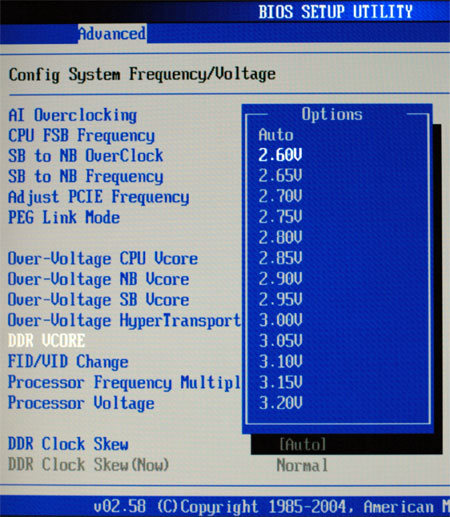
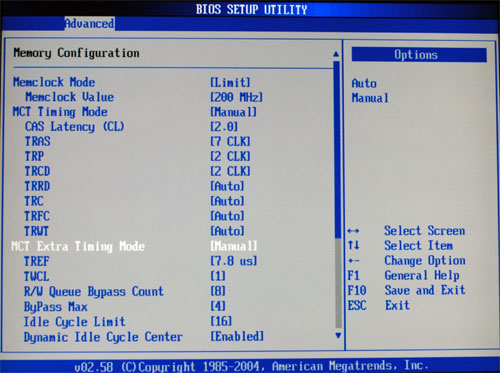
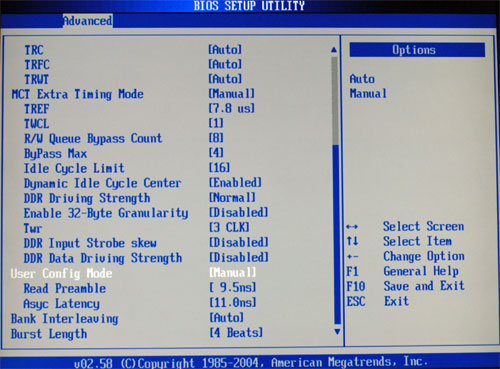
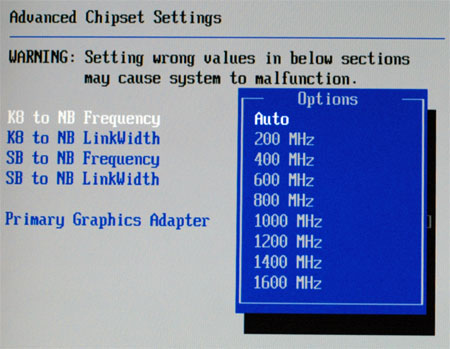
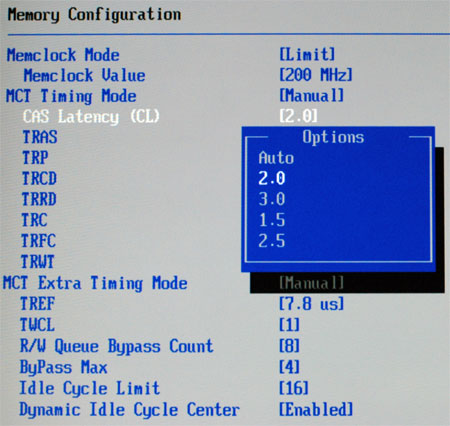










95 Comments
View All Comments
deeltje - Saturday, November 5, 2005 - link
________________________________________________________________________________________I've been waiting for this board for over 2 weeks now and it still isn't available anywhere in europe.
So i would love to get this board shipped from USA to The Netherlands (where i live).
Does anyone know a good USA Computershop that has these boards in stock and accept Mastercard payments!?!?!?!?
I don't care about the shippingcosts, as long as they can ship FAST :)
________________________________________________________________________________________
Tanclearas - Friday, November 4, 2005 - link
If we're supposed to upgrade to new drivers to take advantage of improvements, Nvidia needs to seriously work on their driver upgrades, especially the platform drivers. To avoid problems, we have to use a third-party driver cleaner. The only users that seem to get NAM working are those that do a fresh install of Windows. Any attempt to upgrade drivers and enable NAM results in BSOD.This has been brought up before, with AT staff saying that it would be looked into if we could point to information about the problems. Users posted links to forum threads of users experiencing the problem, and there have been more threads since Nvidia released new drivers, but still we wait to hear any follow-up from AT or Nvidia.
Brian23 - Friday, November 4, 2005 - link
seriously.I'm running 6.66 forceware drivers right now. I'm thinking about formatting so I can get that 17% increase from 6.82. However, I have an ATI card. Is the performance increase due to the forceware drivers, or the graphics drivers? Or is it from the combination of the two?
Either way, we need a way to upgrade the drivers safely without all the crap of reformatting.
Wesley Fink - Saturday, November 5, 2005 - link
The 6.82 platform drivers are officially just for Dual X16. The latest platform driver for the regular nForce4/SLI chipset is 6.70. The video drivers that boost performance are the 8x.xx series. The released version on the nVidia website is 81.85 which can be used to improve performance of all recent nVidia video cards. There is also a Beta 81.87 floating around.bob661 - Friday, November 4, 2005 - link
Aren't the 6.82's for the x16 motherboards only?psychobriggsy - Friday, November 4, 2005 - link
Thanks for the review.This is a really nice looking motherboard. The passive cooling is very much welcomed, and the 8-phase power is interesting, and if it saves power that's good.
I hope that nVidia sort out their audio woes soon however. I look at my >30 month old nForce2 system and that's got way better integrated audio. On a $200 motherboard, is the dolby fee really an issue?
I could only see one SATA connector for the SI SATA.
3 PCI slots is nice for backwards compatibility, but in the long run things will emerge for PCIe, and the x4 slot is great and all (esp. for a decent SATA RAID card, then again, there's 6 fricking SATA ports already on the motherboard), but would it have done much harm to have another PCIe slot in place of one of the PCI slots? As long as the middle PCI slot was left for a decent audio card anyway.
How are the Firewire, SATA and Gigabit controllers connected? Via PCI or PCIe?
How does the power draw at the socket compare with other solutions?
cyberfrog4646 - Friday, November 4, 2005 - link
I've read a bunch of complaints on the recent Asus boards that the chipset fans are quite loud and have been breaking down. Is that a potential problem on this board?Perfomance to cost wise, is their any reason to choose the Asus over the DFI board?
Zebo - Friday, November 4, 2005 - link
BTW all you got to do is replace chipset fan with a passive chipset heat sink on any asus' budget boards... like $5.. I do anyway on any board ( I cut stock heat sinks in quarters on my table saw). Can't stand those 6000+ rpm whinners.. that particular high pitched tone is really ear pierceing to me.Capt Caveman - Friday, November 4, 2005 - link
Umm, this motherboard doesn't have any chipset fans but uses passive heatpipes for cooling. Did you read the review or look at the pics?cyberfrog4646 - Friday, November 4, 2005 - link
HAHAHAH, whoops, i just looked at the benchmarks and conclusion. I thought the the pipe was for the cpu based on the opening picture. Ah well, thanks for the info.